Selected Reviews by Subject:- Film, TV, DVDs, CDs, media critics | Health, Medical | Jews (Frauds, Freemasons, Religions, Rules, Wars) | Race | Revisionism | Women | Bertrand Russell | Richard Dawkins | Martin Gardner | H G Wells
Cesare Salmaggi & Alfredo Pallavisini: 2194 DAYS OF WAR
Reviewed by Rae West 10 January 2022
Conventional Cleansed History of the Jewish Victory, but from Jewish-Defined Losers
Jewish (and collaborator) censorship has so far ensured that the Second World War, and the First, remain misunderstood. If the facts become reinterpreted correctly, this must be attributed largely to Internet, which has allowed hugely increased international and intranational discussion.
First published in 1977, the book's style is a product (I think) of post-1945 Milan typesetting and printing, in what must have been 'hot metal' and pre-digital production. It's about 8" by 11" format (similar size to Kemp's March of the Titans, but thicker), produced for a new market of widely-sold books with an eye on the remaindered and cut-price book market. Many of David Irving's books were made by Mondadori. The production values of 2194 are on the cheap side; the earlier book A History of Warfare by Montgomery (1968) included colour plates and art paper.
There are two interesting aspects to this book: (1) Its origin is Italian, and has material too from German sources. (2) It's big and hefty and looks exhaustive, with every day of the War listed, the bare presentation helped out by (in effect) marginal comments.
The compilers are stated to be Salmaggi and Pallavisini. I thought I recognised Salmaggi from Miles Mathis's piece on Mussolini, benito.pdf. I was wrong about that; Salmaggi was presumably not one of the families found in Miles Mathis. But I recommend Mathis's account for his account of the oddity of Mussolini's promotion from nowhere, and the parallel oddities with Hitler. But beware that Mathis is more-or-less covertly fed by Jewish material.
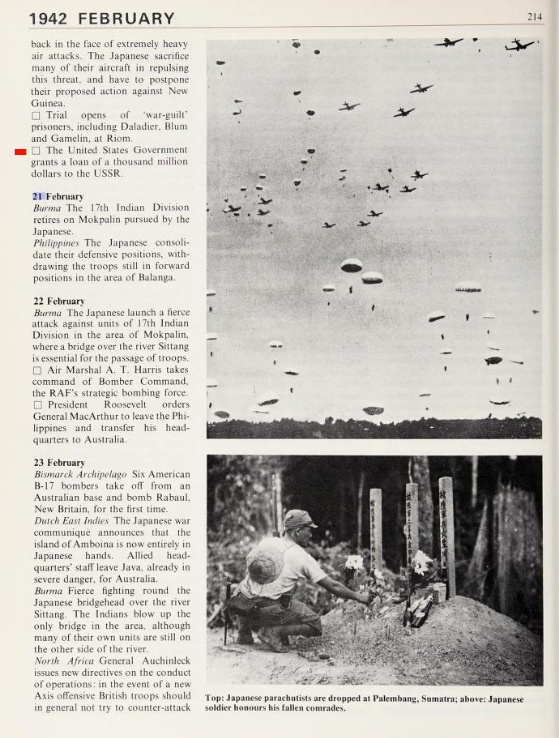
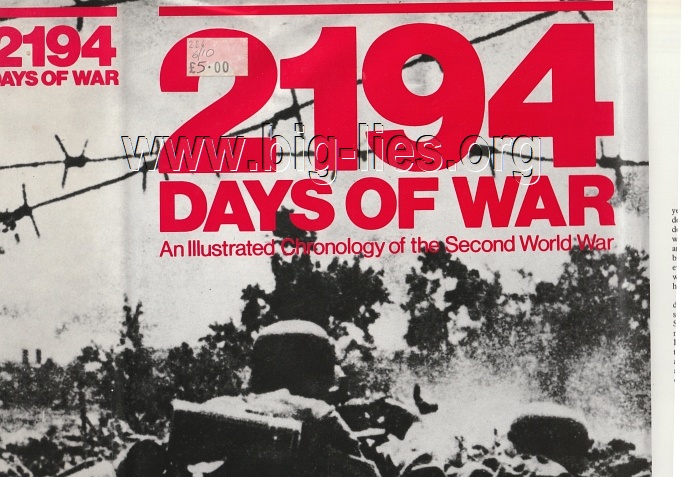
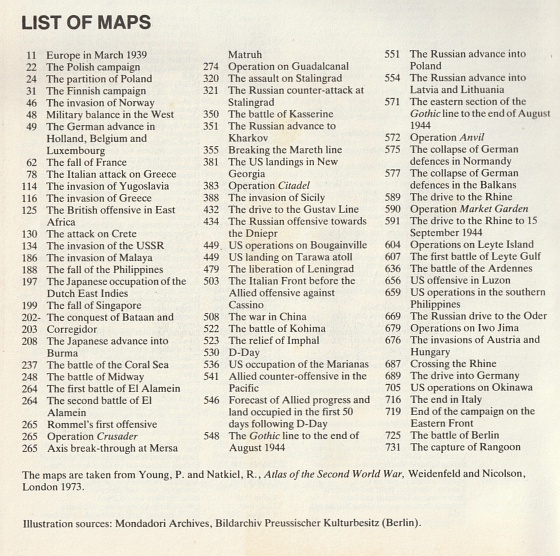
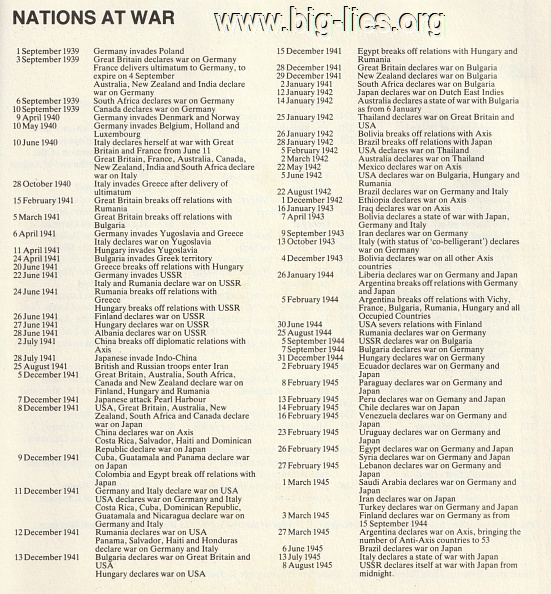
2194 Days of War 760 pages, 13-page index, detailed index of 'Nations at War' from Germany invades Poland to USSR declares war against Japan, with many rather comic-sounding declarations (see the table of 'NATIONS AT WAR', above). And index of maps, I think all in sequence.
It has to be said that the paper quality, at least in my edition, has a slightly blotting-paper feel, and the photos and diagrams are all monochrome, which admittedly suits the subject matter, but makes close examination difficult. Photos include some confidently claimed by Miles Mathis to be fakes.
The cover design blurb calls it an illustrated chronology compiled by Cesare Salmaggi & Alfredo Pallavisini. Plus some extra material. Most of it says it's translated from Italian by Hugh Young. My copy is 1977, by Arnoldo Mondadori, Milan. Published by Windward, NY (among other distributors). ISBN 1856051455; but cover shows 0-8317-8899-2 and another.
Three columns per page. Black/white photos. Yearly summaries on single pages. Some tan pages: Anne Frank, Casablanca a propaganda film, biographies, schematic of Japanese battleship, Tom Mix, Saint Exupery.... The 'Holocaust' is not in the index.
Claims to include contradictory versions of events, and tried to reach a balance. It's difficult to assess how true this is, of course. The USA and UK produced official histories after many years, and of course Churchill wrote an awful lot.
The index includes 'Jews, persecution of', but no more on Jews. It claimed 55 million dead, and 3 million missing. Monte Cassino is not indexed; nor is the Bengal Famine; atrocities seem omitted. I found little on Nanking in China. The treatment of the Hiroshima myth is brief, completely wrong, and mostly on the Manhattan Project.
It's interesting to be reminded how non-industrial was much of the war, when out of reach of Jewish finance. There's a photo of mounted Cossacks, racing across a plain, but obscured by a smokescreen. Cossacks are not indexed, however. And nor is the incident in which Cossacks were send back to the USSR to be killed by Stalin. Refugees are not indexed; obviously this was a code-word for Jews most of the time. One wonders whether the death-rate for horses exceeded the total in Napoleon's time.
Intelligence is not indexed; Bletchley Park wasn't revealed for many years, and it was clearly important not to mention Rothschilds. In the USA and Germany, in the 'Great War', two Warburg brothers were heads of intelligence, respectively. Probably this wasn't generally known. William Joyce is not indexed. The CIA (founded later) could not be expected to be present, but the OSS ('Office of Strategic Services') is not indexed either.
Small countries in eastern Europe, bearing in mind Jewish hatred for Slavs, seem relatively well-represented in this book. Consider regions such as Yugoslavia and Czechslovakia, and Poland and Baltic states. May help decoding such 'Nations at War' items as 'Italy and Rumania declare war on USSR'. Other decodings might help with 'Costa Rica, Cuba, Dominican Republic, Guatemala, and Nicaragua declare war on Germany and Italy.'
In view of asset-grabbing by Jews, it seems anomalous that nobody produces balance-sheets of before and after the War. In fact, it's clear that strenuous efforts are made to avoid this. And yet cartographic-minded people backed by accountants might have produced maps with assets before and after indicated, and regions devastated, and changes in possessions and housing. Why not? But this is an unheard-of presentation, easily swept aside by lies and atrocity stories and distractions.
For a pale anticipation of what might become the standard for assessing wars, let me quote from my remarks on a book on the Vietnam War, printed before 2194:
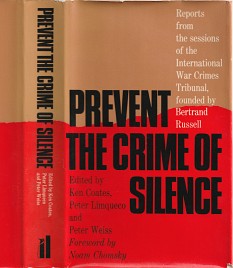
There are no illustrations whatever, despite a large collection claimed by Russell in his Autobiography, Vol III—which seems to be unavailable on archive.org—some of which were circulated in universities by the Vietnam Solidarity Committee.
My best guess is that the book was used to blackwash US troops and US arms, and it was successful, but censored. Probably it was kept in reserve by Jews, to be used later as an anti-white weapon. Perhaps people living now will be faced with murder by people quoting from such books.
The book is clearly a propaganda weapon. Noam Chomsky's role was to bemoan 'American' activities, while never mentioning their Jewish-supremacist origin, and Jewish printed money. Peter Weiss was described as a 'playwright'; he must have been a Jew. Peter Limqueco seems to have been from the Philippines, and a typically Jewish University type.
War Aims. About 25 years earlier, H G Wells complained about information on war aims being refused. Russell had similar difficulties with war aims: his view, repeated below by others such as Basso, Kolko and Sartre, was that raw materials and markets for industrial products, were the key. Russell had no awareness of Talmudic Jew principles, which had come to include central bank control of money, control and testing of weapons, ownership of land, control of businesses, control of police and law, and control of education. Many of the Tribunal members were Jews, perhaps all of them.
Given this insight, the invasions attributed to the USA—in fact, Jewish wars using USA thuggery—are easily accounted for. Russell missed the deep picture.
Another aspect, which may perhaps date back to the entire period of Judean effects and harm, is population redistribution; presumably, if goyim were regarded as useless, they would be slaughtered; but other might be used as prostitutes, slaves, or invaders. The 'Old Testament' has of course much evidence of this.
The inside blurb mentions the Nuremberg trials and the US Supreme Court, at this stage both known to be laughable travesties of law. Chomsky, Sartre and the rest automatically accept the Jewish propaganda established around the Second World War. Read how horror imposed on other people becomes a plaything for Jews and for mercenaries.
So 2194 Days looks like a conventional treatment, ignoring Jews and their collaboratots, but assembled by losers rather than winners. But I quite liked it for its detail. I'd suggest people trying to learn from it cross-reference it with Hexzane527's sceptical examination.
The pdf form of the scanned book is on archive.org and looks helpful for burrowers into the 20th century's vast Jewish victories.
HTML and scanning by Rae West. I've owned this book for years; I thought a review might help other burrowers. - 10 January 2022